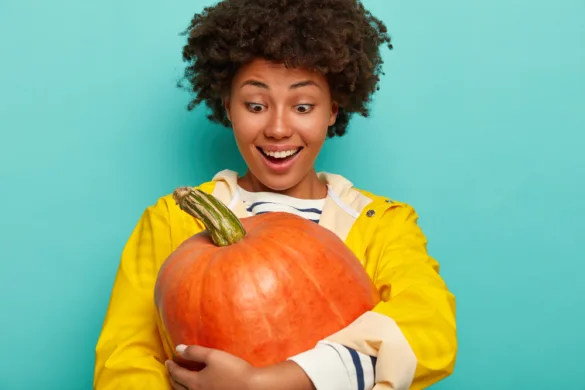As the autumn season arrives, pumpkins start to take center stage in supermarkets, cafes, and restaurants. If you’re a pumpkin lover, you might be curious about its health benefits and how much you should eat. Is pumpkin truly as nutritious as it seems? Read on to explore the health benefits of pumpkin, its nutritional profile, and delicious ways to incorporate it into your daily diet.
Highlights
- Pumpkin is packed with antioxidants, fiber, and key vitamins.
- It may reduce inflammation, improve eye health, and support digestion.
- Versatile in cooking—can be added to both sweet and savory dishes.
Health Benefits of Pumpkin
1. You May Have Less Inflammation
Pumpkins are rich in beta-carotene, an antioxidant that the body converts into vitamin A. Antioxidants help protect against oxidative stress, reducing inflammation linked to conditions like heart disease, arthritis, and diabetes.
2. You May Have Better Eye Health
Vitamin A in pumpkins supports eye health, especially in low-light conditions, while vitamins C and E help protect against long-term damage from oxidative stress.
3. You May Have Better Immune Health
Pumpkins are packed with vitamin C, E, and iron, all of which are essential for a strong immune system, especially during cold and flu seasons.
4. You May Experience Less Constipation
Pumpkin is high in fiber, which aids digestion and prevents constipation. A single cup provides a quarter of your daily fiber needs. Don’t forget the pumpkin seeds—they’re fiber-rich too!
5. You May Have Lower Blood Pressure
Pumpkin is a fantastic source of potassium, which helps regulate blood pressure by promoting vasodilation and aiding sodium excretion.
Pumpkin Nutrition
According to USDA data, one cup of canned, unsweetened pumpkin puree contains:
- Calories: 83
- Carbohydrates: 20 g
- Dietary fiber: 7 g
- Protein: 3 g
- Vitamin A: 1,910 ug (more than twice the daily recommended intake)
- Potassium: 505 mg
- Iron: 3.4 mg
- Vitamin C: 10 mg
- Vitamin E: 2.6 mg
Pumpkin is low in calories but high in nutrients, making it a nutritious addition to any meal.
Is Pumpkin Safe for Everyone?
Yes, pumpkin is safe for everyone, though consuming extremely high amounts (50 cups a day) could lead to vitamin A toxicity. Overeating may also cause your skin to develop a slight orange tint, but this is harmless and reversible.
Tasty Ways to Enjoy Pumpkin
- Blend it into Breakfast: Add pumpkin puree to overnight oats, smoothies, or muffins.
- Add it to Snacks: Pumpkin Spice Energy Balls are a quick and easy snack to increase your fiber intake.
- Include it in Baked Goods: Try pumpkin bread, pies, or even a Pumpkin Swirl Cheesecake for a fall-inspired dessert.
- Use it in Main Dishes: Pumpkin works well in savory dishes like risottos, pastas, and even chili, adding a smooth texture and subtle sweetness.
Frequently Asked Questions
- What happens if you eat pumpkin every day?
Eating pumpkin daily can offer health benefits, such as improved digestion, eye health, and immunity, thanks to its fiber and vitamin content. - What are the side effects of eating pumpkin?
Most people can safely enjoy pumpkin, but overconsumption could lead to temporary orange-tinted skin. - Does pumpkin detox your body?
No, pumpkin does not “detox” the body. Our liver and kidneys handle detoxification, though pumpkin can support overall health.
News related to pumpkin
Switzerland has a new pumpkin champion!
A massive pumpkin weighing 727.5 kilograms, grown by a participant from Zurich, recently won the Swiss Pumpkin Championship in Jona, St. Gallen. This giant vegetable continues to highlight the importance of pumpkins in both agriculture and local competitions, especially during the fall season.
Pumpkin is a rewarding crop for organic farms as well
In the Netherlands, De Terp Squash Only, the largest organic pumpkin grower in the country, is leading the way in both convenience and sustainability trends. The company produces around seven million kilograms of pumpkins each year, sourcing from both local growers and imports from countries like South Africa and New Zealand.
After a fire in 2022, De Terp opened a new processing kitchen to develop convenience products, helping to utilize pumpkins that would otherwise be discarded due to cosmetic imperfections.
Pumpkin Farmer Crafts Solution for Halloween Waste
Every year, an estimated 18,000 tonnes of pumpkins are thrown away in the UK. These pumpkins often end up in landfills, producing methane, a harmful greenhouse gas contributing to climate change. Harriott encourages people to cook the pumpkins they use for decoration after Halloween, helping to reduce waste.
According to environmental charity Hubbub, 40% of UK consumers purchase pumpkins for carving during Halloween, but 60% of them don’t use the leftovers for food and simply discard the remains. While the carvings from pumpkins are safe to eat, pumpkins left outdoors with candles are no longer suitable for consumption. This trend underscores the need for better awareness about food waste and sustainability during the Halloween season.
The Bottom Line
Pumpkin is a versatile and nutritious food, rich in fiber, potassium, iron, and vitamins A, C, and E. Incorporating pumpkin into your diet can improve eye health, strengthen your immune system, lower blood pressure, and aid digestion. Whether you’re enjoying pumpkin-based snacks or hearty healthy diet, there’s no reason to limit this superfood to fall—enjoy it all year long!
Important Note:
Pumpkin is more than just a fall favorite; it’s a nutrient-dense fruit that can benefit your health all year round.
